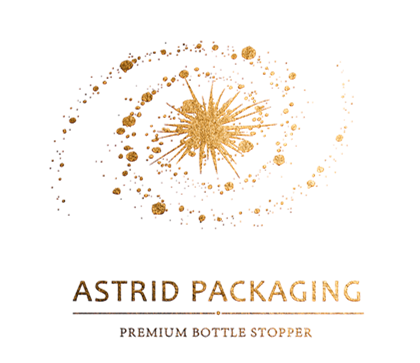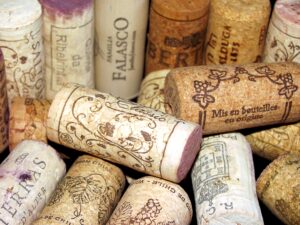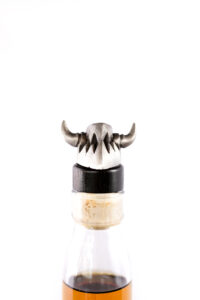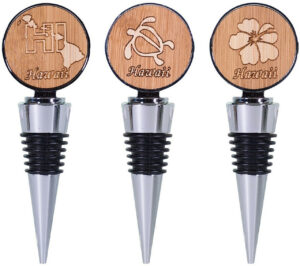Introducción
Definición de tapones de vino
A wine stopper is a device used to seal a bottle of wine to prevent air from entering and to preserve the quality and flavor of the wine. It is typically made of various materials such as cork, plastic, rubber, or metal. The main purpose of a wine stopper is to create an airtight seal, ensuring that the wine remains fresh and free from oxidation. Wine stoppers come in different styles and designs, ranging from traditional cork stoppers to modern and innovative ones. They not only serve a functional purpose but also add an aesthetic touch to the wine bottle. The choice of wine stopper can depend on personal preference, the type of wine being sealed, and the desired level of preservation. Overall, wine stoppers play a crucial role in maintaining the integrity and longevity of a bottle of wine.
Importancia de los tapones de vino
Wine stoppers play a crucial role in preserving the quality and taste of wine. The importance of wine stoppers cannot be overstated, as they prevent oxygen from entering the bottle and causing oxidation. Oxidation can lead to the spoilage of wine, resulting in a loss of flavor and aroma. Additionally, wine stoppers help maintain the carbonation in sparkling wines and prevent leaks or spills. Choosing the right style and material of wine stoppers is essential to ensure the longevity and freshness of the wine. Whether it’s a traditional cork stopper, a synthetic stopper, or a screw cap, each type has its advantages and considerations. Ultimately, the choice of wine stopper depends on personal preference and the type of wine being stored. Regardless of the style or material, investing in high-quality wine stoppers is a wise decision for any wine enthusiast or connoisseur.
Overview of different styles and materials
When it comes to wine stoppers, there is a wide variety of styles and materials to choose from. Each style and material offers its own unique benefits and characteristics. Some common styles include cork stoppers, synthetic stoppers, and glass stoppers. Cork stoppers are traditional and widely used, offering a natural and breathable option for sealing wine bottles. Synthetic stoppers, on the other hand, are more durable and consistent in their performance. Glass stoppers provide an elegant and visually appealing option, often used for premium wines. In addition to the different styles, there are also various materials used in wine stoppers, such as stainless steel, silicone, and wood. These materials can add a touch of sophistication or functionality to the wine stopper. Overall, the choice of style and material depends on personal preference and the specific needs of the wine being sealed.
Tapones de corcho
History of cork stoppers
The history of cork stoppers dates back centuries. Cork, a natural material obtained from the bark of cork oak trees, has been used as a stopper for wine bottles since ancient times. The ancient Greeks and Romans were among the first to recognize the unique properties of cork, such as its elasticity, durability, and ability to create an airtight seal. Over the years, cork stoppers have remained a popular choice for sealing wine bottles due to their effectiveness in preserving the quality and flavor of the wine. Today, cork stoppers continue to be widely used, although alternative materials such as synthetic corks and screw caps have also gained popularity in recent years.
Ventajas de los tapones de corcho
Cork stoppers have been used in the wine industry for centuries, and they offer several advantages over other types of wine stoppers. One of the main advantages is their ability to create a tight seal, which helps to preserve the quality and flavor of the wine. Cork stoppers also allow for a small amount of oxygen to enter the bottle, which can enhance the aging process of certain wines. Additionally, cork stoppers are a renewable and sustainable material, as they are harvested from the bark of cork oak trees without causing any harm to the trees. This makes them an environmentally friendly choice for wine enthusiasts. Overall, the advantages of cork stoppers make them a popular and reliable choice for sealing wine bottles.
Desventajas de los tapones de corcho
Cork stoppers, while traditional and widely used, do have some disadvantages. One major drawback is the potential for cork taint, which occurs when a chemical compound called TCA contaminates the cork and imparts an unpleasant musty odor and taste to the wine. This can greatly affect the overall quality and enjoyment of the wine. Additionally, cork stoppers are susceptible to leakage and breakage, which can lead to spoilage of the wine. Another disadvantage is that cork stoppers require a specific type of corkscrew for removal, which can be inconvenient for some wine enthusiasts. As a result, alternative materials such as synthetic corks and screw caps have gained popularity as they offer a more reliable and consistent seal. Despite these disadvantages, cork stoppers still hold a certain charm and tradition in the wine industry, and many wine lovers appreciate the ritual and ceremony of opening a bottle with a cork stopper.
Tapones sintéticos
Introduction to synthetic stoppers
Synthetic wine stoppers have become increasingly popular in recent years due to their many advantages over traditional cork stoppers. These stoppers are made from materials such as plastic or rubber, which makes them more durable and less susceptible to damage or breakage. Additionally, synthetic stoppers provide a tighter seal, preventing oxygen from entering the bottle and ensuring the wine stays fresh for a longer period of time. They are also more cost-effective and environmentally friendly compared to cork stoppers, as they can be easily recycled. In this article, we will explore the different styles and materials of synthetic wine stoppers, highlighting their benefits and drawbacks.
Ventajas de los tapones sintéticos
Synthetic wine stoppers offer several benefits over traditional cork stoppers. One of the main advantages is their consistency in quality. Unlike natural cork, which can vary in density and porosity, synthetic stoppers are manufactured to have uniform properties, ensuring a reliable seal every time. Additionally, synthetic stoppers are less prone to cork taint, a common issue that can affect the taste and aroma of wine. They also provide a longer shelf life, as they are not susceptible to drying out or crumbling like cork stoppers. Furthermore, synthetic stoppers are more cost-effective, making them a popular choice for wineries and wine enthusiasts alike. Overall, the use of synthetic stoppers in the wine industry has revolutionized the way wines are sealed, offering improved quality control and preserving the integrity of the wine for longer periods.
Inconvenientes de los tapones sintéticos
Synthetic stoppers, while being a popular alternative to traditional cork stoppers, do have some drawbacks. One major drawback is their potential to impart a plastic-like taste or odor to the wine. This can greatly affect the overall quality and enjoyment of the wine. Additionally, synthetic stoppers may not provide as effective of a seal as cork stoppers, which can lead to increased oxidation and spoilage of the wine over time. Another drawback is the environmental impact of synthetic stoppers, as they are typically made from non-biodegradable materials such as plastic or rubber. This can contribute to waste and pollution in the long run. Despite these drawbacks, synthetic stoppers are still widely used due to their affordability and consistency in preventing cork taint, a common issue associated with natural cork stoppers.
Tapones de cristal

Overview of glass stoppers
Glass stoppers are a popular choice among wine enthusiasts due to their elegant and sophisticated appearance. They are often made from high-quality glass, which not only adds a touch of luxury to the wine bottle but also allows the consumer to appreciate the color and clarity of the wine. Glass stoppers are known for their airtight seal, effectively preserving the flavor and aroma of the wine. Additionally, they are reusable and environmentally friendly, making them a sustainable option for wine lovers. Whether used for decorative purposes or practical reasons, glass stoppers offer a stylish and functional alternative to traditional cork or synthetic stoppers.
Ventajas de los tapones de vidrio
Glass stoppers offer several advantages over other materials. Firstly, they are visually appealing and can enhance the overall presentation of a wine bottle. The transparent nature of glass allows the consumer to easily see the color and clarity of the wine, adding to the sensory experience. Additionally, glass stoppers are airtight, ensuring that the wine remains fresh and free from oxidation. Unlike cork stoppers, glass stoppers do not impart any flavors or odors to the wine, preserving its true taste. Furthermore, glass stoppers are reusable and eco-friendly, reducing waste and contributing to sustainable practices. Overall, glass stoppers provide a stylish and functional alternative to traditional wine closures.
Limitaciones de los tapones de vidrio
Glass stoppers, although aesthetically pleasing and reusable, have some limitations when it comes to preserving the quality of wine. One of the main drawbacks of glass stoppers is their lack of airtightness, which can lead to the oxidation of the wine over time. Additionally, glass stoppers are more fragile compared to other materials, making them prone to breakage. This fragility also makes it difficult to achieve a tight seal, resulting in a higher risk of wine leakage. Despite these limitations, glass stoppers can still be a stylish and eco-friendly option for short-term wine storage or for decorative purposes.
Metal Stoppers
Introduction to metal stoppers
Metal wine stoppers are a popular choice among wine enthusiasts due to their durability and aesthetic appeal. These stoppers are typically made from materials such as stainless steel or aluminum, which provide a sleek and modern look. The use of metal stoppers also allows for a tight seal, preventing air from entering the bottle and preserving the quality of the wine. Additionally, metal stoppers can be easily cleaned and reused, making them a sustainable option. In this article, we will explore the various styles and materials of metal wine stoppers, highlighting their unique features and benefits.
Ventajas de los tapones metálicos
Metal wine stoppers offer several benefits compared to other materials. Firstly, they provide a tight seal that helps preserve the quality and flavor of the wine for a longer period. The durability of metal stoppers ensures that they can be reused multiple times without losing their effectiveness. Additionally, metal stoppers are resistant to corrosion and do not impart any unwanted flavors or odors to the wine. This makes them a popular choice among wine enthusiasts who want to maintain the integrity of their favorite bottles. Lastly, metal stoppers can add a touch of elegance and sophistication to the presentation of a wine bottle, making them a visually appealing option for both personal use and gifting purposes.
Challenges of metal stoppers
Metal stoppers for wine bottles present several challenges. One of the main challenges is the potential for metallic taste or odor to be transferred to the wine. This can greatly affect the overall taste and quality of the wine. Additionally, metal stoppers can be prone to corrosion, especially when exposed to moisture. This can lead to rust or other forms of deterioration, which can compromise the integrity of the wine bottle seal. Another challenge is the difficulty in removing metal stoppers, as they often require special tools or techniques. This can be inconvenient for both consumers and wine professionals. Despite these challenges, some wine enthusiasts appreciate the aesthetic appeal and durability of metal stoppers, making them a popular choice for certain styles of wine.
Plastic Stoppers
Overview of plastic stoppers
Plastic wine stoppers are a popular choice among wine enthusiasts due to their affordability and versatility. They are made from various types of plastic, such as polyethylene, polypropylene, and silicone, which offer different levels of durability and flexibility. Plastic stoppers are lightweight and easy to use, making them convenient for everyday wine consumption. Additionally, they provide an airtight seal, preventing oxygen from entering the bottle and preserving the wine’s freshness. Despite their advantages, plastic stoppers may not be suitable for long-term aging as they can allow minimal amounts of oxygen to permeate over time. Nonetheless, plastic stoppers are a practical option for short-term storage and casual wine enjoyment.
Ventajas de los tapones de plástico
Plastic stoppers offer several advantages over other materials when it comes to wine preservation. Firstly, plastic stoppers are known for their excellent sealing properties, ensuring that the wine remains fresh and free from oxidation. Additionally, plastic stoppers are lightweight and easy to handle, making them convenient for both producers and consumers. Another advantage of plastic stoppers is their affordability, making them a cost-effective option for wineries. Furthermore, plastic stoppers are resistant to moisture and do not impart any flavors or odors to the wine, allowing the true characteristics of the wine to shine through. Overall, plastic stoppers provide a practical and reliable solution for preserving the quality and taste of wines.
Desventajas de los tapones de plástico
Plastic stoppers, although widely used, have several disadvantages. Firstly, they are not as effective in preserving the quality and taste of the wine compared to other materials such as cork. This is because plastic stoppers do not allow for the necessary exchange of oxygen, which is crucial for the aging process of wine. Additionally, plastic stoppers have a shorter lifespan and are more prone to deterioration and breakage, leading to potential leakage and spoilage of the wine. Furthermore, plastic stoppers are not as aesthetically pleasing as other materials, such as natural cork, which adds to the overall presentation and experience of enjoying a bottle of wine. Therefore, while plastic stoppers may be a cost-effective option, they come with significant drawbacks that impact the overall enjoyment and preservation of the wine.





